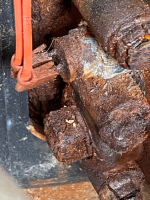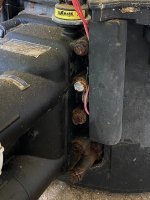- Jul 10, 2021
- 49
- Pool Size
- 15000
- Surface
- Plaster
- Chlorine
- Salt Water Generator
- SWG Type
- Hayward Turbo Cell (T-CELL-5)
I have a SW pool and evidently the saltiness of the water rusted out the contacts for the HLS on my Max E Therm SR400NA heater. I replaced the HLS, added new sliding L shaped connectors, etc....
My question is how to avoid the rusting in the future? Perhaps I need to cover it with a rubber boot or something that doesn't conduct electricity, just to keep water from splashing on it when I have to change the filter, etc... that allows a lot of water in the area to splash around and undoubtedly get to those parts which are exposed. Below is a picture of the old one for context.
My heater is the round bodied one versus the box shape. The box shaped ones appear to better protect the components below.
Thanks for any thoughts.
Pat

My question is how to avoid the rusting in the future? Perhaps I need to cover it with a rubber boot or something that doesn't conduct electricity, just to keep water from splashing on it when I have to change the filter, etc... that allows a lot of water in the area to splash around and undoubtedly get to those parts which are exposed. Below is a picture of the old one for context.
My heater is the round bodied one versus the box shape. The box shaped ones appear to better protect the components below.
Thanks for any thoughts.
Pat





